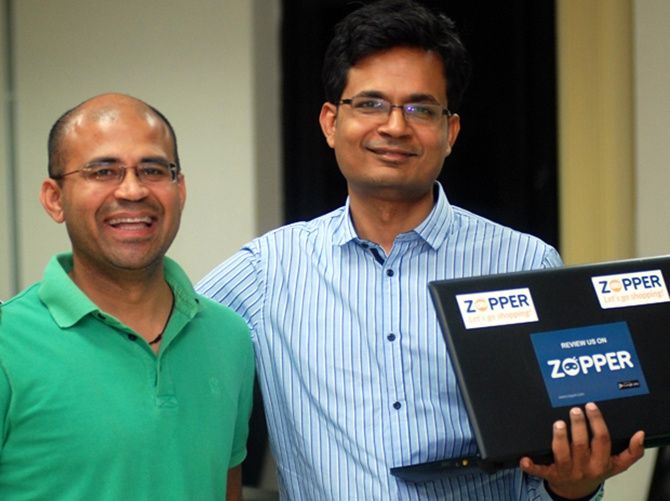
Zopper, a price comparison site, with 2,000 online and 200,000 offline merchants on board, aims to increase user activity 100 times in 3 years.
Manish Kumar (name changed) has been running an electronics shop in Delhi for 58 years. Like others in his business, he has been seeing a drop in footfall. "People are getting better prices on the internet," he says.
After he listed his business on zopper.com, his "margins are less but volumes are more", he says. To compete with online marketplaces that offer huge discounts, he cut margins significantly. "We have to adapt with the times. For the past two months, my profits have increased to Rs 60,000," he adds.
 Zopper has 200,000 offline merchants on its website. The company, set up by Indian Institute of Management graduates Neeraj Jain and Surjendu Kuila, aspires to be the "Google for shopping". "We have been helped by our educational backgrounds. Also, the market (e-commerce) we chose is very large," says Kuila.
Zopper has 200,000 offline merchants on its website. The company, set up by Indian Institute of Management graduates Neeraj Jain and Surjendu Kuila, aspires to be the "Google for shopping". "We have been helped by our educational backgrounds. Also, the market (e-commerce) we chose is very large," says Kuila.
"The real difference (between Zopper and other websites) is we have the largest catalogue (of online and offline merchants), the largest merchant listings and the widest price discovery," says Jain. After contacting an offline merchant, a customer can go to the merchant's store to see the product.
The website's traffic has risen three times in a year - from 10,000 users a day in August last year to 30,000 users a day in August this year. Its engagement time has risen 10 times in the past 10 years. "We want to provide the best product from the best merchant at the lowest price to consumers," says Jain.
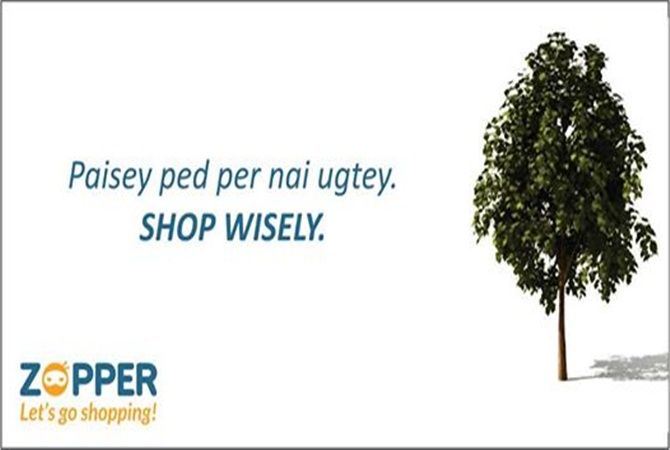 Blume Ventures and Ventureast carried out seed funding in 2011, this June, the company raised $5 million in its third funding-raising round, led by Tiger Global and Nirvana Ventures. "Tiger Global's investment is proof of the brand value we have created," says Karthik Reddy, managing partner, Blume Ventures, which participated in the first two rounds of funding.
Blume Ventures and Ventureast carried out seed funding in 2011, this June, the company raised $5 million in its third funding-raising round, led by Tiger Global and Nirvana Ventures. "Tiger Global's investment is proof of the brand value we have created," says Karthik Reddy, managing partner, Blume Ventures, which participated in the first two rounds of funding.
On Zopper's features, Rajan Mehra, managing director of Nirvana Ventures, says, "More than 90 per cent of product purchase transactions take place online. Most websites we saw in the space were focused on showing the lowest online price to consumers, not providing great finding experiences and listing options for merchants."
Kuila is glad the company managed to secure investors who see the bigger picture. "Our kind of ideas doesn't play out well with investors who have a short-term focus."
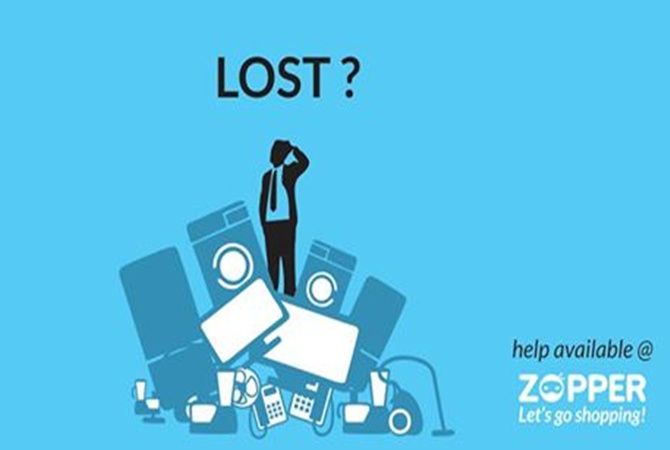 The beginning
The beginning
Zopper began its journey as reviews42.com, a review platform. Soon, it became clear building a sustainable revenue model through a reviews compilation website wasn't possible. "Brands were asking us to remove negative reviews, something we didn't want to do," Jain says.
As such, reviews42.com was converted to Zopper. "The change from reviews compilation website to the starting point of shopping was gradual," Jain says.
For Zopper, the primary source of earnings is lead generation, which accounts for about 90 per cent of revenue. Whenever a customer uses the website to reach a merchant, the merchant has to pay the company a fixed percentage of the sale. It also earns revenue from fixed monthly subscription fees from merchants.
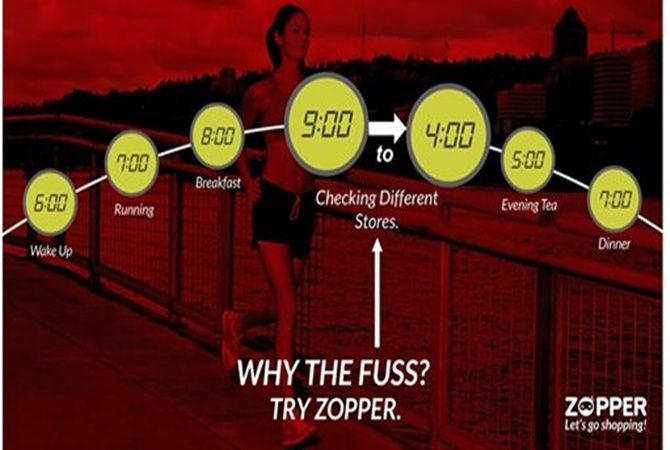 While Zopper has tied up with 2,000 online merchants and 200,000 offline ones, 40 per cent of its revenue is accounted for by the online segment. "Zopper identified the importance of a strong catalogue very early. It had a vision of using this catalogue to enable offline merchants and consumers to have the best experience," says Mehra.
While Zopper has tied up with 2,000 online merchants and 200,000 offline ones, 40 per cent of its revenue is accounted for by the online segment. "Zopper identified the importance of a strong catalogue very early. It had a vision of using this catalogue to enable offline merchants and consumers to have the best experience," says Mehra.
"We are trying to mimic the offline shopping behaviour on a digital platform," says Jain.
The company is yet to record profits. "Premature earnings can distract you from creating an excellent product and business," says Kuila. He is confident Zopper will start earning profits in the next few months.
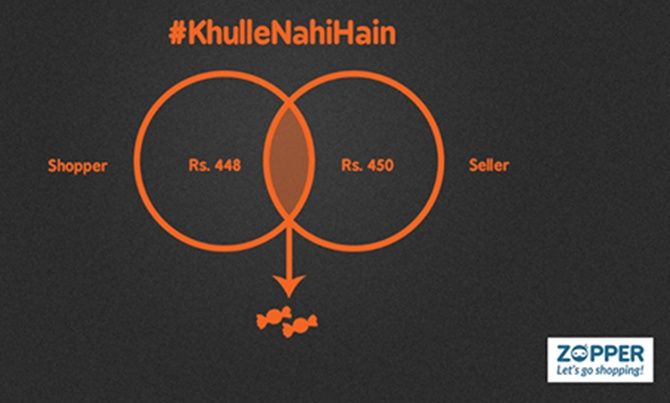 Goals and challenges
Goals and challenges
While Zopper has been facing challenges such as bringing small merchants aboard, it has set ambitious targets. The company aims to see user activity rise 100 times in three years. "Five years down the line, our goal is to get 15 million merchants," says Kuila.
Reddy expects Zopper to become a major player in the shopping segment in about six months. "We will keep aggressively pushing our strategy of providing the best market to customers and merchants."
Both Reddy and Jain expect Zopper to be a major e-commerce company in six months. Asked how the company plans to achieve this, Jain says, "Some of these are business secrets but, broadly, we will make it very easy for users to find the lowest prices on a real-time basis. This will be a complete game changer."
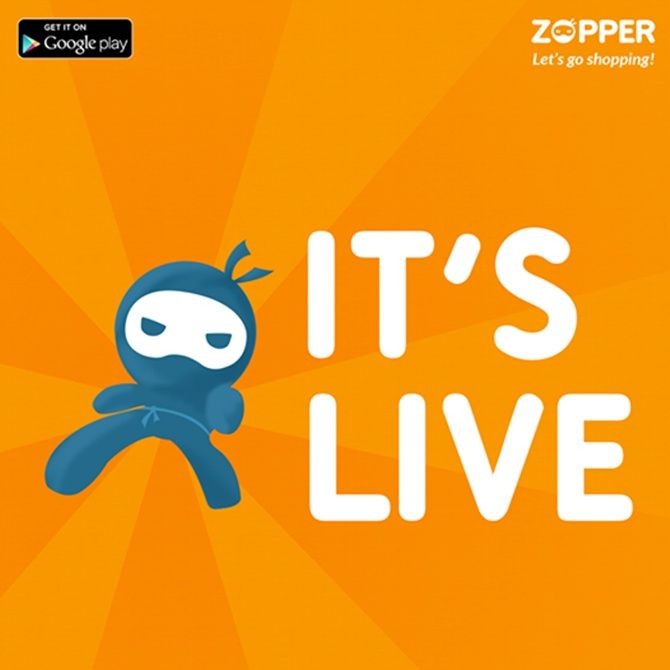 Sulakshan Kumar, co-founder of price comparison website mysmartprice.com, says, "Lead generation for offline (merchants) will be a big business, but the success depends on providing decent business volumes to every retailer, month on month."
Sulakshan Kumar, co-founder of price comparison website mysmartprice.com, says, "Lead generation for offline (merchants) will be a big business, but the success depends on providing decent business volumes to every retailer, month on month."
It is no secret that offline merchants have been hit the hardest by the online marketplace revolution. It will be interesting to see whether Zopper succeeds in integrating these two segments in its model.
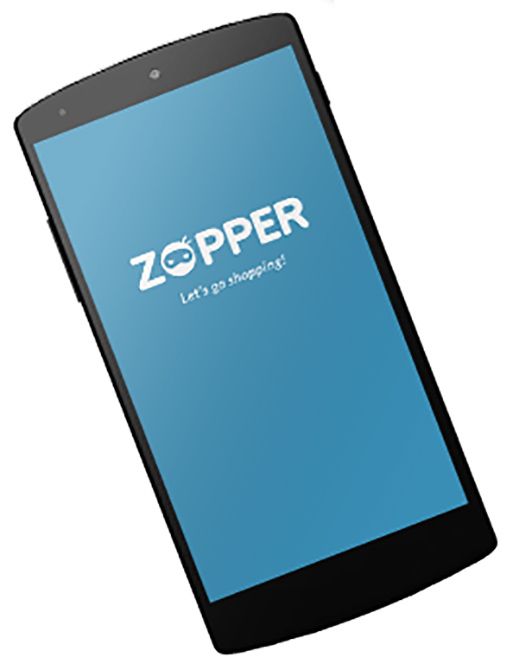 Expert Take: Mukul Singhal
Expert Take: Mukul Singhal
Zopper is operating in an interesting space of bringing an offline inventory of products and services online.
With the increase in smartphone penetration among small businesses, this could open big markets. In India, we have Just Dial as an example of a big business brining offline services online.
In the case of Zopper, the initial traction is good and promising. The key to success in this business is creating smooth user experience. Offline merchants are highly fragmented.
There are pain points around information asymmetry and fulfilment. This can be addressed through technology. Historically, start-ups have tried desktop products, which weren't adopted by small businesses.
Lately, I have seen very good adoption of mobile products among merchants. As smartphone penetration is increasing and merchants are using platforms such as WhatsApp, it has become easy to get on to mobile platforms.
I think for Zopper, the key will be merchants adopting its technology platform so that exchange of information is easy and user experience is smooth.
Mukul Singhal, Principal at SAIF Partners









